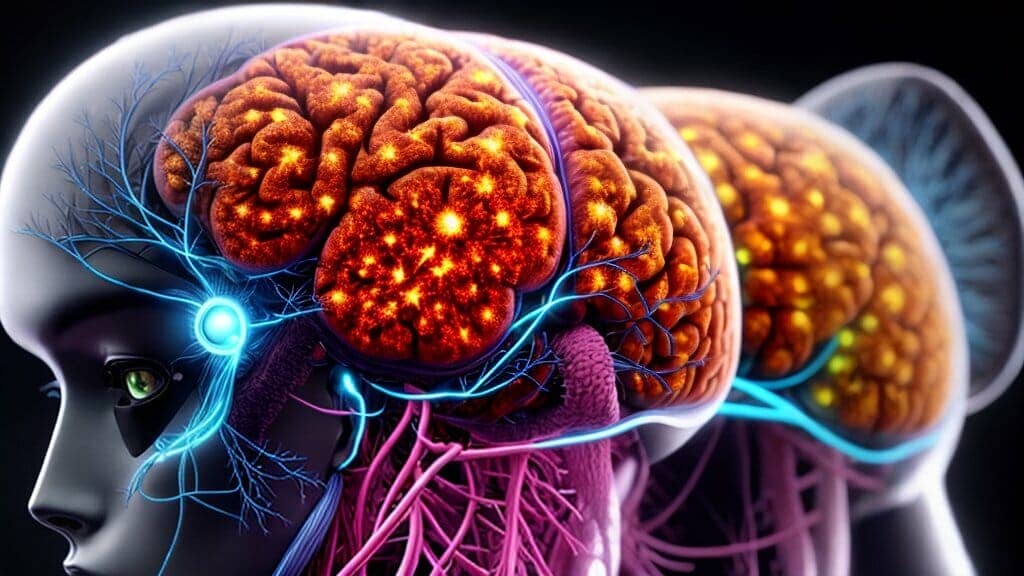Lyme Disease is a tick-borne illness caused by the bacterium Borrelia burgdorferi that can affect multiple systems in the body, including the endocrine system. The endocrine system is responsible for producing and regulating hormones that control various functions in the body, such as metabolism, growth, and reproduction. Lyme Disease can disrupt hormonal regulation and lead to hormonal imbalances, causing a range of symptoms. This section will provide an overview of the link between Lyme Disease and the endocrine system.
Key Takeaways:
- Lyme Disease can affect the endocrine system, which produces and regulates hormones in the body.
- Hormonal imbalances caused by Lyme Disease can lead to a range of symptoms.
- This section will provide an in-depth look at how Lyme Disease impacts the endocrine system.
Understanding the Endocrine System
The endocrine system is a complex network of glands and organs that produce and regulate hormones in the body. These hormones serve as messengers, traveling through the bloodstream to various organs and tissues to control a range of functions, including growth and development, metabolism, and reproduction.
The endocrine system includes several key glands, such as the pituitary gland, thyroid gland, adrenal glands, ovaries, and testes. Each of these glands produces different hormones, which work together to maintain balance and homeostasis in the body.
The endocrine system is regulated by a variety of mechanisms, including feedback loops that help to maintain hormone levels within a certain range. When functioning properly, the endocrine system helps to keep the body in a state of optimal health.
However, when the endocrine system is disrupted, it can lead to a range of health problems, including hormonal imbalances, endocrine disorders, and other conditions.

“The endocrine system plays a crucial role in maintaining overall health and wellness. Understanding how it works is an important step in identifying and treating conditions that affect the hormonal balance in the body.”
Lyme Disease: An Overview
Lyme Disease is a bacterial infection that is primarily spread through the bite of infected blacklegged ticks, also known as deer ticks. The disease is named after the town of Lyme, Connecticut, where it was first identified in 1975.
In the United States, Lyme Disease is most prevalent in the Northeast, Mid-Atlantic, and Upper Midwest regions. According to the Centers for Disease Control and Prevention (CDC), approximately 476,000 cases of Lyme Disease are reported each year in the United States.
The symptoms of Lyme Disease can vary and may include fever, headache, fatigue, and a characteristic skin rash called erythema migrans. If left untreated, Lyme Disease can spread to other parts of the body and lead to more severe symptoms.
Diagnosis of Lyme Disease typically involves a physical exam and blood tests. Treatment usually involves antibiotics, which can be highly effective if started early.

Lyme Disease and Hormonal Imbalances
Lyme Disease can disrupt the normal functioning of the endocrine system, leading to hormonal imbalances. These imbalances can affect the production and regulation of hormones in the body, potentially causing a range of symptoms and health complications.
One hormone that can be impacted by Lyme Disease is cortisol, which is produced by the adrenal glands. Lyme Disease can cause adrenal fatigue or insufficiency, leading to low cortisol levels and a range of symptoms such as fatigue, weakness, and low blood pressure.
Thyroid hormones can also be affected by Lyme Disease, potentially leading to hypothyroidism or Hashimoto’s thyroiditis. Symptoms of these conditions may include weight gain, fatigue, and sensitivity to cold.
In addition, Lyme Disease can affect sex hormones, leading to irregular menstrual cycles, decreased libido, and infertility in some cases.

It is important to note that hormonal imbalances can also be caused by other factors, so it is important to receive a proper diagnosis from a healthcare professional. Treatment for hormonal imbalances caused by Lyme Disease may involve antibiotics to treat the underlying infection, as well as hormone replacement therapy or other medications to manage symptoms.
“Lyme Disease can cause adrenal fatigue or insufficiency, leading to low cortisol levels and a range of symptoms such as fatigue, weakness, and low blood pressure.”
Lyme Disease and Adrenal Function
The adrenal glands, located above the kidneys, produce hormones that help regulate metabolism, immune system, blood pressure, and response to stress. Lyme Disease can impact the adrenal glands, leading to adrenal fatigue or insufficiency.
Research suggests that Lyme Disease can cause the body to produce excessive amounts of cortisol, a hormone produced by the adrenal glands in response to stress. This can eventually lead to a state of adrenal fatigue, where the adrenal glands are unable to keep up with the demand for cortisol production and other hormones.
Adrenal fatigue can cause a range of symptoms, including fatigue, muscle weakness, low blood pressure, mood swings, and difficulty managing stress. In severe cases, adrenal insufficiency may occur, where the adrenal glands are unable to produce enough cortisol and other hormones to maintain normal bodily functions.
It is important for individuals with Lyme Disease to be aware of the potential impact on adrenal function and to work closely with a healthcare provider to manage and treat any related symptoms.

Lyme Disease and Thyroid Dysfunction
Thyroid dysfunction is another potential impact of Lyme Disease on the endocrine system. The thyroid gland plays a crucial role in regulating metabolism and producing hormones that control growth and development. When Lyme Disease disrupts the normal functioning of the thyroid gland, it can lead to hypothyroidism or Hashimoto’s thyroiditis, an autoimmune disorder.
In Hashimoto’s thyroiditis, the immune system attacks the thyroid gland, causing inflammation and damage that can lead to decreased hormone production. This can result in symptoms such as fatigue, weight gain, and depression.
Some studies have found a correlation between Lyme Disease and an increased risk of developing thyroid dysfunction. However, more research is needed to fully understand the connection between the two conditions.
If you are experiencing symptoms of thyroid dysfunction, it is important to talk to your healthcare provider. They can perform blood tests to check your hormone levels and determine the best course of treatment.

Lyme Disease and Pituitary Gland
The pituitary gland, also known as the “master gland,” plays a crucial role in the endocrine system by regulating hormone production and release. However, Lyme Disease can negatively impact the functioning of the pituitary gland, leading to hormonal imbalances and other health issues.
According to a study published in the Journal of Investigative Medicine, Lyme Disease can cause inflammation in the pituitary gland, which can affect the release of hormones such as growth hormone, thyroid-stimulating hormone, and adrenocorticotropic hormone. In some cases, this can lead to conditions such as hypothyroidism or adrenal insufficiency.
Additionally, Lyme Disease can disrupt the communication between the pituitary gland and the adrenal glands, which can lead to adrenal fatigue or insufficiency. This is because the pituitary gland produces adrenocorticotropic hormone, which stimulates the adrenal glands to produce cortisol. If the communication between the two glands is disrupted, cortisol production can be affected, leading to a range of symptoms such as fatigue, weakness, and low blood pressure.
Overall, it is important for individuals with Lyme Disease to be aware of the potential impact on their pituitary gland and to work closely with their healthcare provider to maintain hormonal balance and overall health.

Holistic Treatments for Lyme Disease
While traditional antibiotics are the mainstay of Lyme Disease treatment, some individuals may benefit from a more holistic approach. The Oasis Medical Institute in Tijuana, MX offers an integrative approach to Lyme Disease treatment that combines conventional medicine with complementary therapies. Led by medical director Dr. Francisco Contreras MD, the Oasis Medical Institute offers a range of holistic treatment options for individuals with Lyme Disease.

At Oasis, each patient receives an individualized treatment plan that may include:
- Nutrition therapy: Nutritional supplements, IV vitamin therapy and a personalized diet plan to support the body’s natural healing processes.
- Hyperthermia: A targeted approach to heating specific parts of the body to kill bacteria and stimulate immune function.
- Ozone therapy: A treatment that involves infusing the body with ozone, which has been shown to stimulate immune function and promote healing.
- Acupuncture: A complementary therapy that uses needles to stimulate specific points on the body, promoting pain relief and overall well-being.
These therapies are meant to complement conventional treatment and help individuals manage symptoms, improve immune function, and reduce inflammation. While there is no cure for Lyme Disease, a holistic approach may help individuals better manage their symptoms and improve their quality of life.
“The integrative approach to Lyme Disease treatment at Oasis Medical Institute offers hope and relief for individuals struggling with this challenging condition” – Dr. Francisco Contreras MD
Oasis Medical Institute: Lyme Disease Treatment Program
The Oasis Medical Institute in Tijuana, MX offers a comprehensive Lyme Disease treatment program that takes a holistic approach to healing. Led by medical director Dr. Francisco Contreras MD, their team of experienced medical professionals takes a personalized approach to each patient’s care, focusing on treating the root causes of their Lyme Disease symptoms.
The Lyme Disease treatment program at Oasis Medical Institute utilizes a combination of conventional and alternative therapies, including antibiotics, ozone therapy, IV nutrient therapy, and more. Their integrative approach to treatment aims to strengthen the immune system and reduce inflammation in the body, while also addressing any hormonal imbalances or other health issues related to Lyme Disease.
| Therapy | Description |
|---|---|
| Antibiotics | Conventional treatment for bacterial infections |
| Ozone therapy | Uses ozone gas to stimulate the immune system and fight infections |
| IV nutrient therapy | Delivers vitamins, minerals, and other nutrients directly into the bloodstream for optimal absorption and healing |
| Herbal and nutritional supplements | Supports the body’s natural healing processes with targeted supplements and herbs |
The team at Oasis Medical Institute also provides patients with a range of supportive therapies, such as chiropractic care, massage therapy, and nutritional counseling, to help them achieve optimal health and well-being.
If you or someone you know is struggling with Lyme Disease, the knowledgeable and compassionate team at Oasis Medical Institute is here to help. Contact them today to schedule a consultation and learn more about their integrative Lyme Disease treatment program.

Lyme Disease Prevention Strategies
Lyme Disease is a serious illness that can have long-lasting effects on the body. While there is no foolproof way to prevent Lyme Disease, there are some steps you can take to reduce your risk.
Avoid Tick Habitats
Ticks thrive in wooded or grassy areas, so it’s important to avoid these habitats as much as possible. If you do need to be in these areas, wear long sleeves and pants, and tuck your pants into your socks to prevent ticks from crawling up your legs. Use insect repellents containing DEET on your skin and permethrin on your clothing.
Perform Tick Checks
After spending time outdoors, check your body for ticks. Pay special attention to your scalp, behind your ears, under your arms, and in the groin area. Ticks can be very small, so use a magnifying glass if necessary. Remove any ticks promptly using fine-tipped tweezers, and clean the bite area with soap and water.
Reduce Tick Populations
You can help reduce the tick population in your yard by keeping the grass short and removing any leaf litter or brush piles. Consider using tick control products or hiring a professional pest control company to treat your yard.
Be Vigilant for Symptoms
If you’ve been bitten by a tick or have spent time in a tick habitat, be vigilant for signs of Lyme Disease. Symptoms may include a rash, fever, fatigue, and joint pain. If you experience any of these symptoms, see your healthcare provider right away.
By following these prevention strategies, you can reduce your risk of contracting Lyme Disease and protect your health.

Conclusion
In conclusion, Lyme Disease can have significant impacts on the endocrine system, leading to hormonal imbalances, adrenal fatigue, thyroid dysfunction, and disruptions in pituitary gland function. It is important for individuals with Lyme Disease to be aware of these potential complications and work with their healthcare provider to monitor and address any related symptoms.
While conventional medical treatments can be effective, many individuals with Lyme Disease have found relief through holistic approaches. The Oasis Medical Institute in Tijuana, MX offers an integrative approach to Lyme Disease treatment, led by experienced medical professionals.
Prevention is also key in avoiding Lyme Disease. By taking measures to avoid tick bites and seeking early detection and treatment, individuals can reduce their risk of complications.
Overall, Lyme Disease and its impacts on the endocrine system are complex and require a comprehensive approach to diagnosis, treatment, and prevention. By staying informed and working closely with a healthcare provider, individuals with Lyme Disease can manage their symptoms and improve their overall quality of life.
FAQ
Q: What is Lyme Disease and how does it affect the endocrine system?
A: Lyme Disease is a tick-borne illness caused by the bacteria Borrelia burgdorferi. It can impact various systems in the body, including the endocrine system. Lyme Disease can disrupt hormonal regulation, leading to imbalances and dysfunction in hormone production.
Q: What is the endocrine system and what are its functions?
A: The endocrine system is a network of glands that produce and release hormones. It regulates numerous bodily functions, including metabolism, growth and development, sexual function, and mood.
Q: What are the causes, symptoms, and diagnosis of Lyme Disease?
A: Lyme Disease is caused by the bite of an infected tick. Common symptoms include fatigue, joint pain, headaches, and a characteristic rash. Diagnosis is typically based on clinical symptoms, as well as blood tests.
Q: How does Lyme Disease contribute to hormonal imbalances?
A: Lyme Disease can disrupt the production and regulation of hormones, leading to imbalances. It can affect hormones such as cortisol, thyroid hormones, and sex hormones, potentially leading to symptoms such as fatigue, weight gain, and mood changes.
Q: What is the impact of Lyme Disease on adrenal function?
A: Lyme Disease can disrupt the normal functioning of the adrenal glands, leading to adrenal fatigue or insufficiency. This can result in symptoms such as fatigue, low blood pressure, and difficulty coping with stress.
Q: How does Lyme Disease affect thyroid function?
A: Lyme Disease is associated with thyroid dysfunction, including conditions such as hypothyroidism or Hashimoto’s thyroiditis. This can lead to symptoms such as fatigue, weight gain, and cold intolerance.
Q: What is the impact of Lyme Disease on the pituitary gland?
A: Lyme Disease can interfere with the normal functioning of the pituitary gland, which plays a crucial role in hormonal regulation. This can disrupt hormone production and lead to imbalances in the body.
Q: What are some holistic treatments for Lyme Disease?
A: Holistic treatments for Lyme Disease focus on addressing the underlying causes of the illness and supporting the body’s natural healing processes. At Oasis Medical Institute, an integrative approach to Lyme Disease treatment is offered, led by medical director Dr. Francisco Contreras MD.
Q: What is the Lyme Disease treatment program at Oasis Medical Institute?
A: The Lyme Disease treatment program at Oasis Medical Institute is a comprehensive approach that combines conventional and alternative therapies. It includes treatments such as intravenous antibiotics, nutritional therapy, detoxification, and lifestyle changes. To book a consultation, interested individuals can contact Oasis Medical Institute.
Q: What are some prevention strategies for Lyme Disease?
A: To reduce the risk of contracting Lyme Disease, individuals should take measures to avoid tick bites. This includes wearing protective clothing, using insect repellent, checking for ticks after spending time outdoors, and seeking early detection and treatment if a tick bite occurs.
Dr. Francisco Contreras, MD is a renowned integrative medical physician with over 20 years of dedicated experience in the field of integrative medicine. As the Medical Director of the Oasis of Hope Hospital in Tijuana, Mexico, he has pioneered innovative treatments and integrative approaches that have been recognized globally for the treatment of cancer, Lyme Disease, Mold Toxicity, and chronic disease using alternative treatment modalities. Dr. Contreras holds a medical degree from the Autonomous University of Mexico in Toluca, and speciality in surgical oncology from the University of Vienna in Austria.
Under his visionary leadership, the Oasis of Hope Hospital has emerged as a leading institution, renowned for its innovative treatments and patient-centric approach for treating cancer, Lyme Disease, Mold Toxicity, Long-Haul COVID, and chronic disease. The hospital, under Dr. Contreras's guidance, has successfully treated thousands of patients, many of whom traveled from different parts of the world, seeking the unique and compassionate care the institution offers.
Dr. Contreras has contributed to numerous research papers, articles, and medical journals, solidifying his expertise in the realm of integrative medicine. His commitment to patient care and evidence-based treatments has earned him a reputation for trustworthiness and excellence. Dr. Contreras is frequently invited to speak at international conferences and has been featured on CNN, WMAR2 News, KGUN9 News, Tyent USA, and various others for his groundbreaking work. His dedication to the medical community and his patients is unwavering, making him a leading authority in the field.
Contreras has authored and co-authored several books concerning integrative therapy, cancer, Lyme Disease and heart disease prevention and chronic illness, including "The Art Science of Undermining Cancer", "The Art & Science of Undermining Cancer: Strategies to Slow, Control, Reverse", "Look Younger, Live Longer: 10 Steps to Reverse Aging and Live a Vibrant Life", "The Coming Cancer Cure Your Guide to effective alternative, conventional and integrative therapies", "Hope Medicine & Healing", "Health in the 21st Century: Will Doctors Survive?", "Healthy Heart: An alternative guide to a healthy heart", “The Hope of Living Cancer Free”, “Hope Of Living Long And Well: 10 Steps to look younger, feel better, live longer” “Fighting Cancer 20 Different Ways”, "50 Critical Cancer Answers: Your Personal Battle Plan for Beating Cancer", "To Beat . . . Or Not to Beat?", and “Dismantling Cancer.”






















